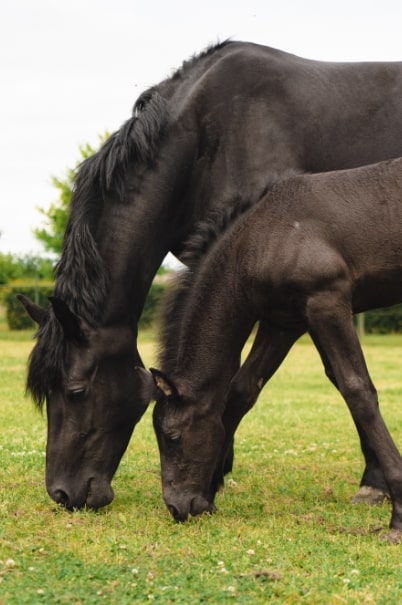There is a lot you need to know about feeding young horses. For example, you need the right horse feed and a good schedule. With this knowledge, you will be able to plan your approach more carefully. We will help you learn about addressing things like nutritional needs, vitamins, and proteins. As a result, you will be able to build a strong, healthy, resilient, and robust body.
More than calories
For owners, keeping your animals in a good body condition is the easy part. You won’t have much trouble supplying the calories, but this is merely part of the picture. The whole is to feed optimum levels of protein. Also, you need to get the ratios and minerals in the diet correct. It will guarantee a fully balanced diet for the best growth and suitable sources of energy.
Taking figures from the NRC 2007 Nutrient Requirements for Horses, let’s take a 6-month old weanling. Next, let’s compare it to an adult animal. It needs around twice the calorie level per kg of body weight as an adult. The youngling will need this each day but also needs 4-5 times the mineral levels and 2.5 times the protein. Thus, if you’re feeding the youngster the same as you are your adult, it won’t get what it needs. Unless you hold an understanding of the average profile of hay or grass and try to fill deficiency gaps for more than calories, your horse won’t have enough nutrition for growth.
How much protein and calcium is needed?
A weanling that has just less than half the weight of an adult must have the same amount of calories as a good doer adult. However, that weanling must have 676g of protein each day instead of 540 grams for an adult good doer possessing a body weight of 500kg.
If you look at calcium levels, the same good doer will need 20g. The weanling needs 38.6g for good bone development.
If you wean a young horse earlier than 6 months, the discrepancy will be larger between the minerals and proteins vs the calories needed. Since the NRC figures are based on Thoroughbreds, you can expect younglings to need even larger amounts than they report. The horse will be from a heavier genetic pool with more muscling and larger bone. It is critical to remember that these are merely the minimal requirements. Talk to us if you need first class horse feed products.
The likes of Irish Draughts, Welsh Cobs, Quarter Horses, and Friesians among others have a genetic predisposition. They need far higher quantities of minerals and protein since they’re far bulkier than a Thoroughbred.
With all we’ve said, you may be wondering why so many horses appear to get to adulthood on so little. At the same time, you should have your answer on why some horses are prone to issues and others are healthy. It all comes down to the mineral and protein start they got in life.
Different supplement methods
There are some different ways you can supplement a youngling horse too. One common strategy is feeding a high protein young stock/concentrate stud feed with 16% protein content. Due to the guidelines for feeding at 1% of body weight, choose a high cereal ration. When fed in these big amounts, the feeds come close to meeting the additional protein demands, and potentially the mineral ones. As for the remainder of the diet, supply it with top tier haylage, hay, or grass.
We will get you the horse feed and other products you need
At JS Hubbuck Ltd, we make sure our customers can meet their needs. These could be ones regarding general farm work or for keeping their animals in good health. Everything we offer is high quality, and we can provide useful advice too.
So, if you need horse feed or other products, make sure you contact us. You can also browse our website to see some of the items we offer.

